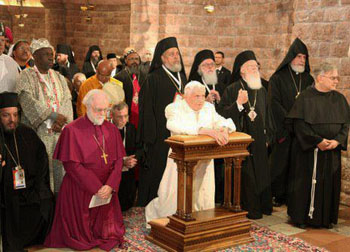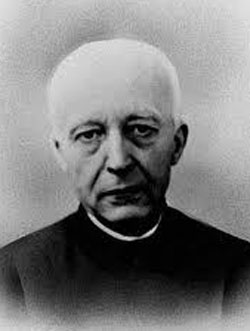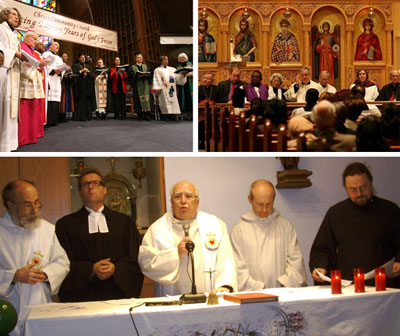 |
Ecumenism
Benedict’s Method of Twisting the Facts
Margaret C. Galitzin
It has already been noted in an article on this website how Pope Benedict XVI has repeatedly twisted the teachings of some of the most traditional of Doctors of the Church, such as St. Robert Bellarmine and St. Augustine, presenting them under a progressivist light to fit the teachings of Vatican II.
Now, following the same method, he is reinterpreting the valorous anti-ecumenist and anti-modernist teachings of Pope St. Pius X, trying to present him as if he were favorable to ecumenism. He recently made remarks of this type to a group of over 8,000 people present at the Vatican’s Paul VI Audience Hall as part of the opening of the Week of Prayer for Christian Unity, which runs from January 18 to January 25.

Benedict prays alongside heretics & schismatics at the IV Assisi Interfaith Meeting, October 2011 |
Benedict stated that the concept of a week of prayer for Christian unity was initiated in 1908 by Paul Wattson, an Episcopalian minister from Maryland. One year later, Wattson became a Catholic and was subsequently ordained to the priesthood. That initiative, Benedict continued, was supported by St. Pius X and Benedict XV (Catholic News Agency, Jan. 19, 2012).
What he did not explain is that when the Anglicans first initiated an Association for the Promotion of the Unity of Christendom in 1857 in England, Cardinal Manning forbade Catholics to take part in it. When the Church Unity Octave was sanctioned in England by Pope Pius X after Wattson’s conversion, it was with the sole aim of encouraging Anglicans to convert to the Catholic Faith. Wattson even renamed it the “Chair of Unity Octave” in order to emphasize that true religious unity can only exist under the Chair of Peter.
Benedict XVI also did not stress that the mentioned meeting was only for Catholics, unlike today’s ecumenical gatherings where the religions pray or act together. In 1916, Benedict XV extended the observance of The Chair of Unity Octave to the entire Church.
The modern ecumenical note was added to that event long after St. Pius X. In the 1930s Fr. Paul Couturier of Lyons, France – a disciple of Teilhard de Chardin – took the initiative of inviting Catholics, Schismatics and Protestants to pray together for unity during a "Universal Week of Prayer for Christian Unity."

Fr. Couturier the progressivist founder of today's Week of Prayers |
In a reflection on the Week of Prayer, Card. Walter Kasper repeats Benedict's history lesson, but points out the significant difference between the goals of Fr. Wattson and Fr. Coulturier,: “While [Fr. Paul] Wattson maintained that the goal of unity was the return to the Catholic Church, Fr. Paul Couturier of Lyons (1881–1953) gave a new impetus to this Week in the 1930s, making it ecumenical in the true sense of the word. He changed the name Church Unity Octave to Universal Week of Prayer for Christian Unity, thus furthering a unity of the Church that ‘Christ wills by the means he wills.’”
Kasper continues: “Paul Couturier can be considered the father of spiritual ecumenism. His influence was felt by the Dombes Group and by Roger Schutz and the Taizé Community.... Today, his ‘invisible monastery’ is at last taking shape through the growing number of prayer networks between Catholic and non-Catholics monasteries, spiritual movements and communities, centers of male and female religious, Bishops, priests and lay people.”
Fr. Couturier advocated prayer "for the unity of the Church as Christ wills it, and in accordance with the means he wills", which he claimed enabled Catholics to join in prayer with “other Christians with differing views of the Petrine ministry.” In 1935, he proposed naming the observance the "Universal Week of Prayer for Christian Unity," a proposal accepted only after Vatican II in 1966.
What both Pope Ratzinger and Card. Kasper let fall into oblivion is that it was precisely to prevent initiatives like that of Fr. Couturier from spreading in the Church that Pope Pius XI wrote the Encyclical Mortalium animus, which attacked the nascent ecumenism. He strongly censures those who promote congresses, meeting and conferences attended by both Catholics and non-Catholics with the aim of being united in certain common doctrines with these words:
“Such efforts can meet with no kind of approval among Catholic because they support the erroneous opinion that all the religions are more or less good and praiseworthy.... Those who hold such a view fall into an open error. They also reject the true Religion; they distort its tenets and fall gradually into Naturalism and Atheism. Therefore, it is perfectly evident that one who joins with the partisans and propagators of similar doctrine abandons entirely the divinely revealed Religion” (Apud, A.S. Guimaraes, Animus Delendi II,Part II, Premise 1, p. 213).
So, when Benedict XVI said that the call for Catholics, Schismatics and Protestants to come together to pray for unity was approved by St. Pius X, he frontally contradicts the facts. Rather, he incurs the condemnations of both St. Pius X and Pius XI.

Ecumenical service in Chicago (top left), New Orleans (top right), and Barcelona, Spain, during Christian Unity Week |
This contradiction hit its peak when he not only praised ecumenism, but also tried to make it mandatory for Catholics. In his talk opening the Week of Prayer, Pope Ratzinger affirmed, “Ecumenism is not an optional extra for Catholics” but is “the responsibility of the entire Church and of all the baptized.” Christians, he said, must make praying for unity an “integral part” of their prayer life, “especially when people from different traditions come together to work for victory in Christ over sin, evil, injustice and the violation of human dignity.”
There is no mention of any kind of conversion to the Catholic Faith in his speech, just a call for “interior conversion” that will lead to everyone praying and working together for social issues and human rights.
To substantiate the real position of St. Pius X, here are the original prayer intentions he approved to achieve true Christian unity and the Social Kingship of Christ:
- January 18: For the return of the "other sheep" to the One Fold of Our Lord Jesus Christ.
- January 19: For the return of the Eastern Schismatics to communion with the Apostolic See.
- January 20: For the return of the Anglicans to the authority of the Vicar of Christ.
- January 21: For the return of all Protestants throughout the world to the unity of the Catholic Church.
- January 22: That heretics and schismatics may be one, in union with the Chair of Saint Peter.
- January 23: That lapsed Catholics may return to the Sacraments of the Church.
- January 24: That the Jewish people may be converted to the Catholic Faith.
- January 25: That missionary zeal may conquer the world for Christ.
A further point to consider in is that today the Week of Prayer for Christian Unity is promoted by the World Council of Churches, a body of 349 Protestants and Schismatic sects seeking unity, common witness and service. (WCC website).
Therefore, when Benedict invites Catholics to attend this Week of Prayer, he is supporting an officially extra-Catholic initiative.
In parishes across the United States today, representatives of the post-conciliar Vatican participate in this ecumenical initiative. Pulpits are exchanged, and special ecumenical worship services are arranged to pray together for unity.
This is obviously in flagrant conflict with the prayer intentions of St. Pius X.

At St. Paul outside the Walls. Benedict closed the 2012 Christian Unity week
with Schismatics and Protestants who came to pray together for unity |

Posted February 1, 2012
Ecumenism | Hot Topics | Home | Books | CDs | Search | Contact Us | Donate
 © 2002-
Tradition in Action, Inc. All Rights Reserved
© 2002-
Tradition in Action, Inc. All Rights Reserved
|
 |
|

|